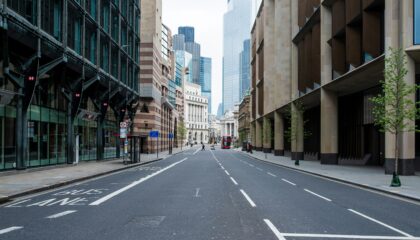State-of-the-art cycling facilities at Glasgow’s Skypark have been awarded a CyclingScore Platinum rating for a best-in-class cycle-friendly infrastructure, the highest certification awarded by the assessor.
Skypark: “an outstanding commitment to cycling”
The recently completed facilities, comprising upwards of 250 bike-parking spaces, e-bike charging points, 236 lockers, segregated showers and changing facilities, a drying room, along with a dedicated cycle repair space and a raft of engagement services, will serve occupants choosing to cycle to and from Skypark.
The project, managed by Workman, transforms Skypark into “Glasgow’s biggest and most cycle-friendly” private business destination, according to owner Federated Hermes. The installation of the new cycling facilities – one element of an ongoing multi-million-pound investment to improve the overall site – benefitted from a £30k grant from Cycling Scotland. The initial design of the new cycling facilities was carried out by CyclingScore Design Lab, in conjunction with Ingram Architecture, who collaborated closely with Workman to achieve the desired outcome.
Craig Watson, associate, Workman, said:
“There has been a real energy behind this project, with cycling becoming an increasingly popular way to commute. The new facilities demonstrate an outstanding commitment to cycling, and mean that Skypark has set new standards as a destination workplace, where health and wellbeing will undoubtedly thrive.”
Skypark: A boon to worker performance
The facilities, says CyclingScore, means Skypark’s 3000-strong workforce is predicted to take 146 days’ less sick leave when 3% of staff cycle to work because cyclists take on average 1.3 days less sick leave than non-cyclists, based on a commuter-cycling study led by Ingrid Hendriksen. This, in turn, may save approximately £14,509 per year, due to the estimated cost of an employee being absent from work being calculated at £100 per day. This according to the Impact of the Cycle to Work Scheme: Evidence Report. Institute of Employment Studies, UK.
What’s more, even with just 3% of the total staff cycling to work, the building is projected to generate 3,223kg fewer greenhouse gases. Compare this with using public transport to travel to work in Glasgow, according to research by CyclingScore.



